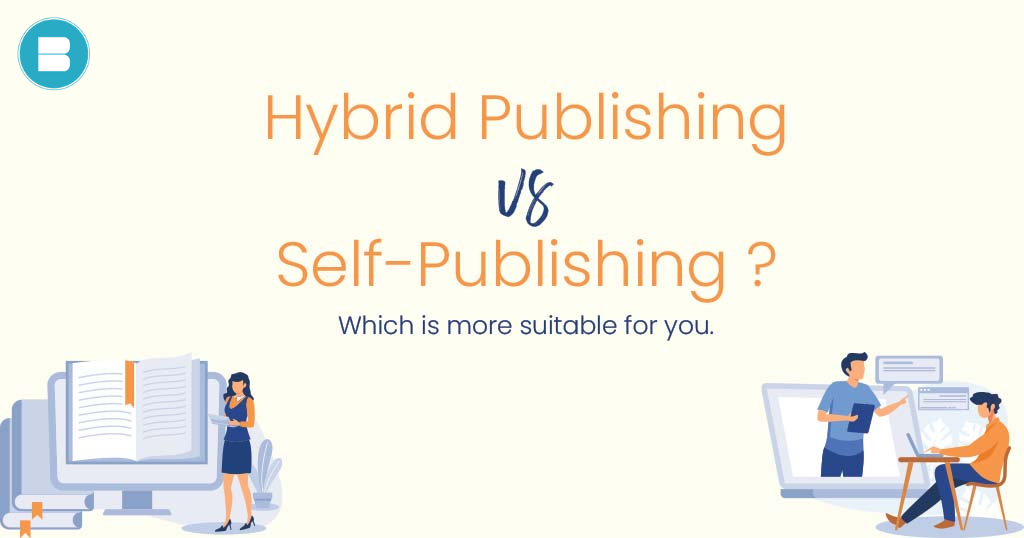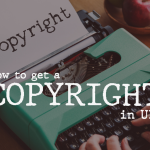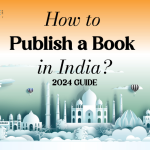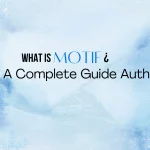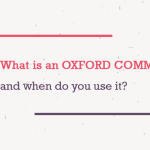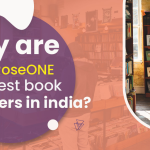Publishing is the art of sharing ideas, stories, and knowledge with the world. Whether it’s through a book, magazine, newspaper, or website, publishing brings information to the masses.
Traditional publishing is like a well-oiled machine, with publishers carefully selecting manuscripts and overseeing the production process from start to finish. They ensure that each book is expertly edited, designed, and marketed to reach the widest audience possible. In return, authors receive a percentage of the profits, also known as royalties.
Read: What is Hybrid Publishing? Is it really worth in today’s time?
Self-publishing, on the other hand, is like being the captain of your own ship. Authors have complete control over the publishing process, from choosing the cover design to marketing the book to potential readers. Self-publishing platforms like Amazon’s Kindle Direct Publishing or IngramSpark make it easier than ever for authors to get their work out into the world.
But what if you want the best of both worlds? That’s where hybrid publishing comes in. With hybrid publishing, authors work with a publisher who provides a range of services, such as editing, cover design, and distribution. However, authors still retain some control over the publishing process, allowing them to have a say in important decisions and ensuring their vision is brought to life.
What is Self Publishing?
Self-publishing is the process of authors independently publishing their own books or other written works, without the involvement of a traditional publishing company or press. In self-publishing, the author takes on many of the responsibilities that a traditional publisher would handle, including editing, formatting, cover design, and marketing.
With the rise of digital publishing, self-publishing has become an increasingly popular option for authors. Self-publishing platforms like Amazon’s Kindle Direct Publishing, BlueRoseONE Publishing and IngramSpark have made it easier than ever for authors to get their work out into the world, with the ability to sell their books through online retailers and reach a global audience.
One of the main advantages of self-publishing is that authors have complete creative control over their work. They can choose the cover design, layout, and formatting of the book, as well as the marketing strategy. Additionally, self-publishing allows authors to keep a higher percentage of the profits from book sales, as they don’t have to share revenue with a traditional publisher.
Read: Learn what are the benefits of Self-Publishing a Book.
However, self-publishing also requires a significant amount of work on the part of the author, including editing, proofreading, and marketing the book. It can be difficult for self-published authors to gain visibility and recognition in a crowded market, and without the support of a publisher, they may struggle to get their books into bookstores or other physical retail outlets.
BlueRose Publishers has been a hope for aspiring writers, empowering them to take the reins of their writing journey as authorpreneurs. As a self-publishing house, it has been instrumental in helping countless individuals turn their dreams into reality, by providing a platform to showcase their literary talents.
Through its innovative approach and unwavering commitment, BlueRose ONE has enabled writers to carve their own path, and emerge as successful authors in their own right. With their support and guidance, the world of literature has witnessed the rise of many talented authorpreneurs..
What is Hybrid Publishing?
Hybrid publishing is an innovative approach to book publishing that takes the best of both traditional publishing and self-publishing. It is the perfect middle ground for authors who want to maintain a certain level of control over their work while benefiting from the experience and resources of a publishing company.
With hybrid publishing, authors work with a team of experts who provide a range of services, such as editing, cover design, distribution, and marketing. The author retains creative control over their work, ensuring that their vision is respected throughout the publishing process.
Unlike traditional publishing, where manuscripts are selected by the publisher and the author has little say in the publishing process, hybrid publishing empowers the author to be involved in important decisions, such as the cover design, pricing, and distribution. This way, the author can ensure that their work is presented in the best possible light and reaches the right audience.
In exchange for these services, authors usually pay a fee or agree to a profit-sharing arrangement with the publisher. This fee varies depending on the level of services provided and may include editing, cover design, formatting, and marketing.
Hybrid publishing is an excellent option for authors who want the support and resources of a publishing company while maintaining creative control over their work. It is also a great option for authors who want to reach a wider audience than they would be able to with self-publishing alone, but may not have the resources or connections to pursue traditional publishing.
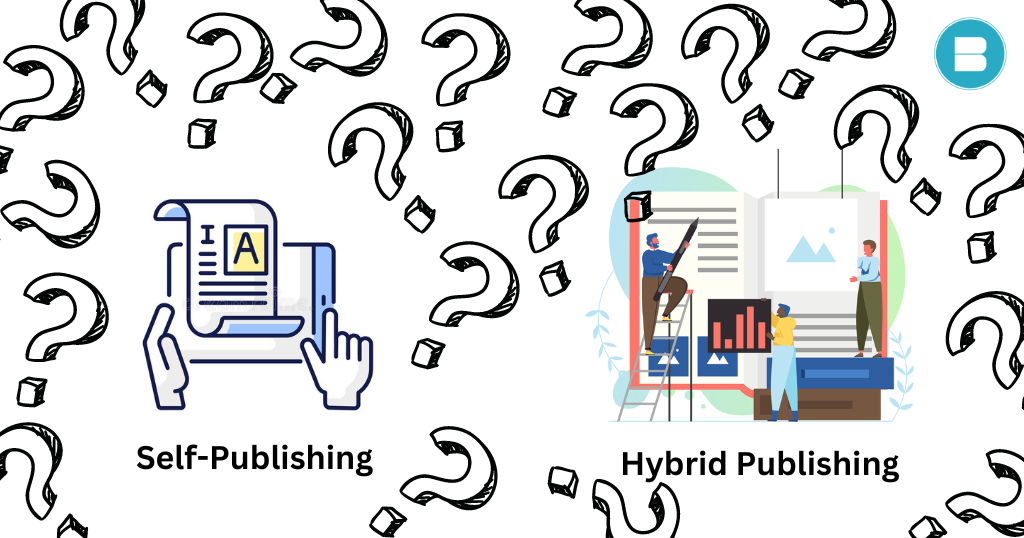
Complete Difference Between Self-Publishing & Hybrid Publishing
Which publishing process is suitable for you?
No one can guarantee which publishing process would be suitable for you, as each individual has different needs and wants for their book. There are certain factors that one can keep in mind to choose what process they think is suitable for you.
- The decision between self-publishing and hybrid publishing depends on the author’s goals, preferences, and resources.
- Self-publishing is suitable for authors who want complete control over the publishing process.
- It allows authors to maximize their profits as they do not have to share royalties with a publisher.
- However, self-publishing requires a significant amount of time, effort, and financial investment to produce a professional-quality book and market it effectively.
- Hybrid publishing offers the benefits of traditional publishing, such as professional editing, cover design, and marketing, while allowing authors to retain creative control and a greater share of royalties.
- The cost of services provided by hybrid publishers can vary significantly, and it is important for authors to research and evaluate different publishers before committing to a partnership.
The factors are as follows:
- Clarify your goals: Identify your book’s objectives and determine if hybrid publishing aligns with your goals or self-publishing. Do you want to make a profit? Expand your readership? Establish yourself as an expert in your field? Knowing what you want to achieve will help you make an informed decision.
- Financial considerations: It’s important to consider your financial situation before choosing hybrid publishing. Since it can be more expensive than self-publishing, you should be aware of your budget and how much you’re willing to invest in the production of your book.
- Choose the right publisher: Research prospective hybrid and self publishers thoroughly to ensure they have a track record of producing high-quality books and working with skilled editors, designers, and marketers. Check reviews and ratings and seek recommendations from other authors.
- Understand the contract: Before signing on with either publisher, thoroughly review the terms and conditions, including any fees and the services that will be provided. Make sure you understand what you’re getting into.
- Assess the level of support: Consider how much support you’ll receive from the publishers. Will they assist with marketing and distribution? Will they help you develop your manuscript? Will you be able to work with an editor or designer? Make sure the level of assistance provided meets your needs and goals.
- Determine your involvement: Hybrid publishing requires more author involvement than traditional publishing and self publishing. Decide how much involvement you want, and ensure that the hybrid publisher you choose allows you to be as involved as you desire.
In conclusion, the decision to choose between self-publishing and hybrid publishing depends on various factors, including the author’s goals, preferences, and resources.
Self-publishing offers complete creative control and a higher profit margin, but requires a significant investment of time and money. Hybrid publishing provides the benefits of traditional publishing, such as professional editing and marketing, while allowing authors to retain some creative control and a greater share of royalties.
Read: Learn what is Amazon KDP? A to Z about Kindle Direct Publishing.
However, it can be more expensive and requires careful research and evaluation of potential publishers. Ultimately, authors should weigh the pros and cons of both options and choose the one that best aligns with their objectives and resources. With the right approach, authors can successfully publish their work and reach their desired audience.
Publish your book for free with BlueRoseONE and become a bestselling author. Don’t let your dream of becoming an author fade away, grab the opportunity now and publish your book – be it fiction, non fiction, poetry or more.

